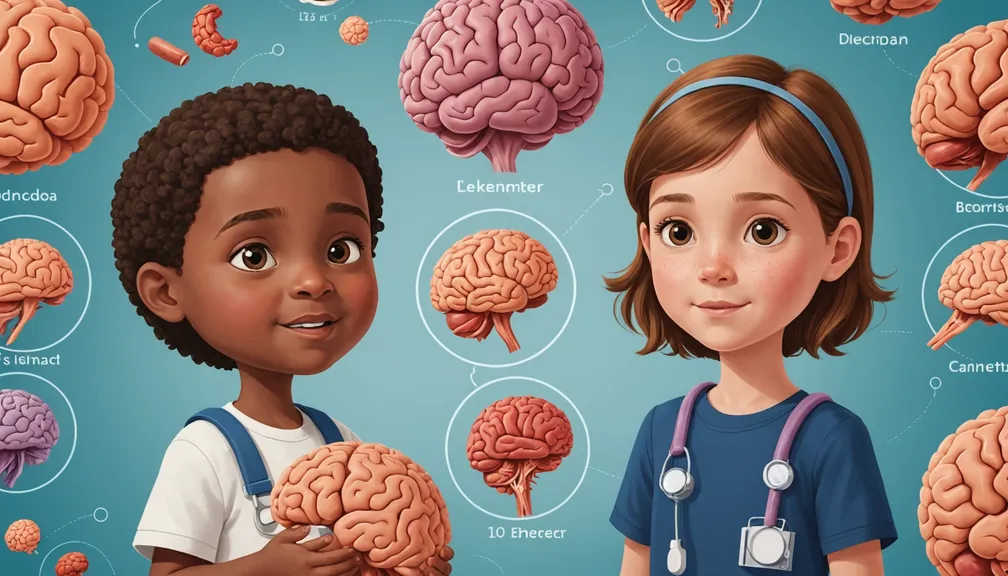Common Pediatric Cancers: Leukemia, Brain Tumors, and More
Understanding Pediatric Cancers
Pediatric cancers are illnesses that affect children and adolescents. Unlike adult cancers, pediatric cancers often involve different types, spread in unique ways, and may respond differently to treatments. Recognizing these differences is crucial for effective management and improving outcomes.
Common Types of Pediatric Cancers
1. Leukemia
Leukemia is the most common type of cancer in children, accounting for nearly 30% of all pediatric cancers.
-
What is Leukemia? Leukemia is a cancer of the blood and bone marrow, where the body produces abnormal white blood cells that interfere with the ability to fight infections.
-
Symptoms:
- Fatigue and weakness
- Frequent infections
- Unexplained bruising or bleeding
- Bone or joint pain
-
Swollen lymph nodes
-
Treatment Options:
- Chemotherapy: Uses drugs to kill cancer cells.
- Radiation Therapy: Targets specific areas with high-energy rays.
- Bone Marrow Transplant: Replaces diseased bone marrow with healthy marrow.
- Targeted Therapy: Uses medicines that specifically attack cancer cells.
2. Brain and Spinal Cord Tumors
Brain tumors are the second most common childhood cancers.
-
What are Brain Tumors? These tumors develop in the brain or spinal cord, affecting how a child thinks, moves, and functions.
-
Types:
- Astrocytoma: Begins in star-shaped brain cells.
- Medulloblastoma: Originates in the lower part of the brain.
-
Ependymoma: Forms in the brain or spinal cord lining.
-
Symptoms:
- Headaches, especially in the morning
- Nausea and vomiting
- Vision or hearing problems
- Balance and coordination issues
-
Seizures
-
Treatment Options:
- Surgery: Removes as much of the tumor as possible.
- Radiation Therapy: Targets remaining cancer cells.
- Chemotherapy: Used alongside other treatments to eliminate cancer cells.
- Clinical Trials: Offer access to new treatments.
3. Neuroblastoma
Neuroblastoma arises from immature nerve cells and is most common in infants and young children.
- Symptoms:
- Swelling or a lump under the skin
- Bone pain or limping
- Abdominal pain
-
Unusual sweating, especially at night
-
Treatment Options:
- Surgery: Removes tumors when possible.
- Chemotherapy: Targets cancer cells throughout the body.
- Radiation Therapy: Used for tumors that cannot be fully removed.
- Immunotherapy: Helps the immune system fight cancer.
4. Wilms Tumor
Wilms tumor is a kidney cancer that primarily affects children.
- Symptoms:
- Abdominal swelling or a palpable mass
- Pain in the abdomen
- Fever
- Hematuria (blood in the urine)
-
High blood pressure
-
Treatment Options:
- Surgery: Removes the affected kidney.
- Chemotherapy: Destroys remaining cancer cells.
- Radiation Therapy: May be needed if cancer has spread.
5. Lymphoma
Lymphoma affects the lymphatic system, which helps fight infections.
- Types:
- Hodgkin Lymphoma: Characterized by the presence of Reed-Sternberg cells.
-
Non-Hodgkin Lymphoma: Includes various subtypes without Reed-Sternberg cells.
-
Symptoms:
- Swollen lymph nodes, often painless
- Fever and night sweats
- Unexplained weight loss
-
Fatigue
-
Treatment Options:
- Chemotherapy: Commonly used for both types.
- Radiation Therapy: Targets affected lymph nodes.
- Immunotherapy: Enhances the body's ability to fight cancer.
Diagnosing Pediatric Cancers
Early detection is vital for successful treatment. Diagnosis typically involves several steps:
- Physical Examination: Checking for lumps or abnormal growths.
- Medical History: Understanding symptoms and family history.
- Imaging Tests:
- X-rays
- MRI (Magnetic Resonance Imaging)
- CT (Computed Tomography) Scans
- Ultrasound
- Biopsy: Removing a sample of tissue for laboratory analysis.
- Blood Tests: Assessing blood cell counts and identifying abnormal cells.
Treatment Approaches
Treatment plans are tailored to each child's specific type of cancer, its stage, and overall health. Common treatment methods include:
- Chemotherapy: Uses powerful drugs to eliminate cancer cells.
- Radiation Therapy: Applies high-energy rays to destroy cancer cells.
- Surgery: Removes tumors and affected tissues.
- Targeted Therapy: Focuses on specific molecules involved in cancer growth.
- Stem Cell Transplant: Replaces damaged bone marrow with healthy stem cells.
- Immunotherapy: Boosts the immune system to fight cancer more effectively.
Supporting the Child and Family
Dealing with pediatric cancer affects the entire family. Support is essential for both the child and their loved ones.
- Emotional Support:
- Counseling and psychological services
- Support groups for patients and families
-
Child life specialists who help children cope with hospital experiences
-
Practical Support:
- Assistance with daily activities and transportation
- Educational support to ensure the child continues learning
- Financial counseling to navigate the costs of treatment
Doctors and Health Professionals Involved
A multidisciplinary team works together to provide comprehensive care for children with cancer:
- Pediatric Oncologist: Specializes in diagnosing and treating childhood cancers.
- Pediatric Surgeon: Performs surgical procedures to remove tumors.
- Radiation Oncologist: Manages radiation therapy treatments.
- Nurse Practitioner: Provides ongoing care and support.
- Social Worker: Assists with emotional and practical needs.
- Psychologist or Psychiatrist: Offers mental health support.
- Dietitian: Ensures proper nutrition during treatment.
- Physical Therapist: Helps maintain physical strength and function.
- Pharmacist: Manages medications and treatment plans.
Moving Forward
Understanding pediatric cancers, their types, symptoms, and treatments empowers families to make informed decisions. Early detection and a dedicated healthcare team are key to improving outcomes and ensuring comprehensive support for young patients and their loved ones.






